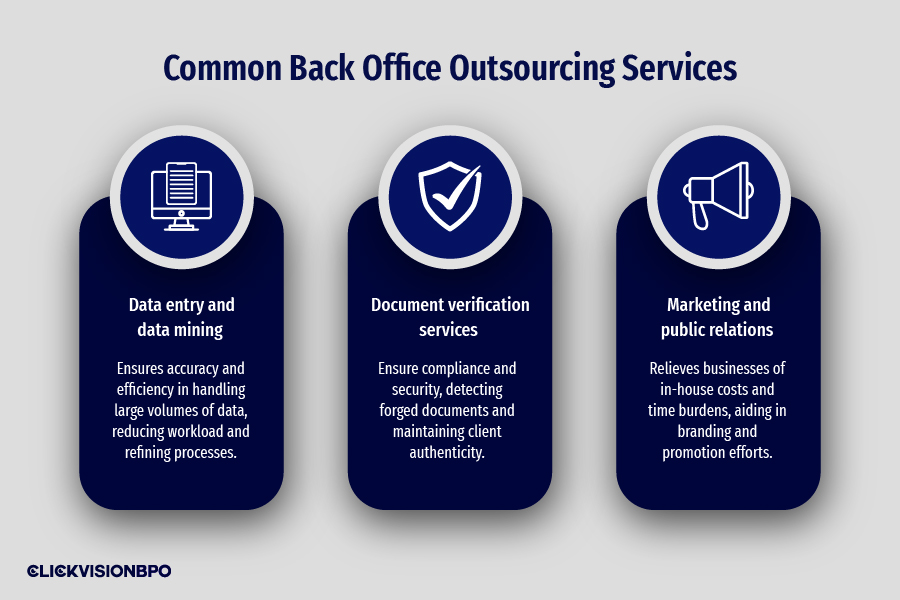Imagine streamlining your business operations, boosting efficiency, and accessing specialized expertise while avoiding hefty costs. Well, this is the reality of companies that embrace back-office outsourcing. So, what is back office outsourcing?
In this article, we will reveal what back office outsourcing represents and why companies use it. We’ll also discuss its biggest advantages and explore some of the most common back-office services.
What Does Back Office Business Process Outsourcing Mean
Back office outsourcing refers to outsourcing non-client-facing services. So what are non-client-facing services, you may ask. In BPO, functions such as accounting, email marketing, and data entry all fall under these services. Basically, back-office BPO involves employees from departments such as IT, accounting, internal communication, etc.; however, this is just a generalized overview of what BPO entails.
Further introspection of this branch reveals that back office BPO is divided into three main subcategories: knowledge process outsourcing, legal process outsourcing, and IT-enabled service outsourcing.

Source: freepik.com / Photo Contributor: westock
Reasons for Back Office Outsourcing
One of the main reasons why companies prefer back-office outsourcing is due to the technical knowledge and expertise involved. Personnel such as IT professionals, accountants, and legislators are not common to the in-house infrastructure. Outsourcing personnel with such expertise allows companies to optimize their back-office operation and reduce the workload of their in-house employees.
With more time and energy in their hands, businesses can divert their focus onto long-term strategic planning. In turn, this allows businesses to gain more flexibility, adapt to industry changes and face certain challenges more easily.
Most importantly, with the help of back-office outsourcing, companies can shift their focus and dedicate more time to core business activities such as product development and customer care.
Among other reasons, data management seems to be one of the biggest motivators for back-office BPO. Since the data volume companies keep has increased in recent years, data organization and storage have become a major concern for many.
With their data scattered across different systems and data security and privacy challenges, businesses find it best to leave data management to experienced back office BPO providers. BPO providers offer data accuracy and excel at mitigating risks while also meeting protection regulations. Overall, the security and management of data make back-office outsourcing a highly attractive option for any type of business.
Benefits of Back Office Outsourcing
A more comprehensive understanding of what is back office outsourcing would be impossible without discussing its benefits. Here are some of the key factors to keep in mind if you are considering back-office outsourcing:
Operational efficiency
Back-office outsourcing providers are fully equipped to deliver enhanced productivity. Their team of experts possesses the necessary knowledge and equipment to perform all the tasks that a certain company might require. Back office BPO is designed to offer organizations support and help streamline an organization’s overall operations regardless of size.
Many might fail to realize this, but investing in back-office BPO allows companies to access the latest technology without purchasing new software. We at CLICKVISION BPO believe this to be a huge advantage as newer technologies are usually designed to offer a better, enhanced workflow, which optimizes performance.
Access to specialized expertise
Another added benefit of back-office outsourcing is that companies gain access to a large pool of specific-skilled professionals. As all business owners know, hiring can be expensive and time-consuming. On the other hand, training in-house employees is also a big capital investment.
When companies partner with BPO providers, they can avoid the need to spend resources on finding and hiring employees. BPO providers already have qualified staff with rich experience, which makes them efficient at handling demanding tasks. It’s a smart way for companies to leverage the expertise of these employees without the hassle of recruitment.

Source: freepik.com / Photo Contributor: The Yuri Arcurs Collection
Cost savings
It’s worth mentioning that running back-office operations in-house can contribute to operational costs. Having an in-house team is a costly investment; it requires significant capital and will likely hinder company expansion and innovation. This is why companies prefer outsourcing back-office functions as a way to reduce spending on non-core activities.
Taking the time to review the potential cost savings that outsourcing can bring is essential. For instance, by collaborating with a BPO company, you won’t need to invest in employee setups, such as office space and computers. You will also save expenses related to salary and benefits, which can be an additional cost relief.
Common Back Office Outsourcing Services
When explaining what is back office BPO, we must offer a few examples to illustrate the type of back office services available. Here are some of the most popular ones:
Data entry and data mining
Accurate data entry is essential to business operations. However, it consumes a lot of time and resources. This is why many businesses prefer to outsource data entry services as a way to achieve greater accuracy and efficiency. By contracting a BPO provider, they reduce the workload while a team of experts in the field is handling their data.
Another major challenge that many companies face is storing and managing their client’s data. Many fail to achieve this due to the lack of more sophisticated software. Companies also struggle with refining raw large-volume data and find data mining a major disruption in their workflow. Due to such reasons, data entry and mining have become some of the most sought-after back-office outsourcing services.
Document verification services
Verification becomes essential in an era of enhanced security accompanied by a wave of client authenticity. Many businesses have a growing need for seamless verification to meet KYC (know your customer) requirements. Identity verification reduces the risk for a company to unwillingly work with individuals or organizations that are involved in illegal activities.
We’ve noticed that the number of companies that need to be able to detect forged documents and rely on ID proof has been growing in recent years. However, keeping a team of experts in document verification in-house can be costly, so outsourcing is the perfect solution.
Marketing and public relations
Marketing is key in promoting and growing a business. However, keeping an in-house team is also time-consuming and costly for most small-scale and medium-scale startups. This is why many BPO companies offer clients PR and marketing services.
These back-office marketing services take care of the branding and marketing campaign aspect and take the heavy load out of your hands. Some of the most common PR and marketing services businesses outsource include content creation, copywriting, and graphic design.

Conclusion
To encapsulate what is back office outsourcing we’d like to emphasize that this is not just a common trend. Instead, it presents a strategic business decision. It offers businesses enhanced operational efficiency and specialized expertise while also reducing expenses.
Overall, back-office BPO stands as a cornerstone for companies looking to optimize operations. Outsourcing takes the burden off and allows companies to shift their focus on core business activities.
Outsourcing back office functions frees up valuable resources, making navigating the complexities of the modern market easier. It allows companies to become more adaptable and stay competitive by having their most important business objectives in focus.

With a strong background in the marketing industry and healthcare leadership roles, Filip is responsible for CLICKVISIONBPO’s sales strategies and onboarding new clients. With a passion for sharing insights gained from his experience, he also shares valuable knowledge through industry related articles.
